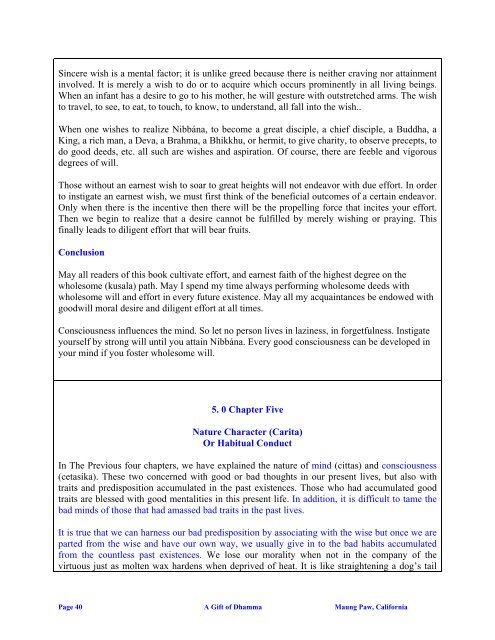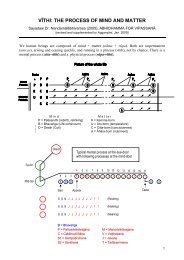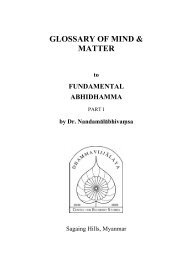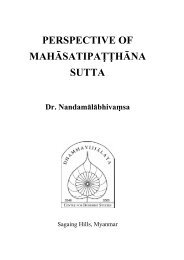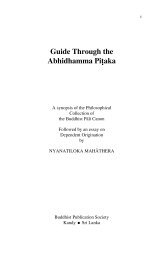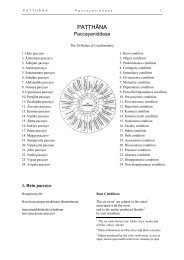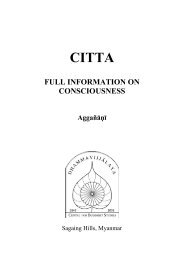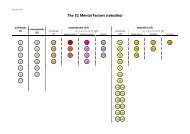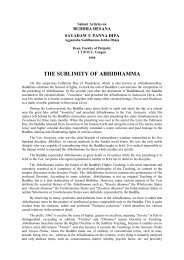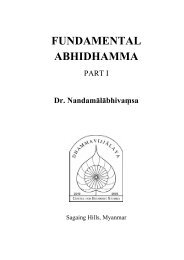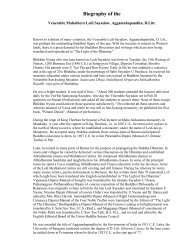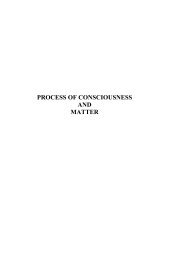ABHIDHAMMA IN DAILY LIFE - Abhidhamma.com
ABHIDHAMMA IN DAILY LIFE - Abhidhamma.com
ABHIDHAMMA IN DAILY LIFE - Abhidhamma.com
Create successful ePaper yourself
Turn your PDF publications into a flip-book with our unique Google optimized e-Paper software.
Sincere wish is a mental factor; it is unlike greed because there is neither craving nor attainment<br />
involved. It is merely a wish to do or to acquire which occurs prominently in all living beings.<br />
When an infant has a desire to go to his mother, he will gesture with outstretched arms. The wish<br />
to travel, to see, to eat, to touch, to know, to understand, all fall into the wish..<br />
When one wishes to realize Nibbána, to be<strong>com</strong>e a great disciple, a chief disciple, a Buddha, a<br />
King, a rich man, a Deva, a Brahma, a Bhikkhu, or hermit, to give charity, to observe precepts, to<br />
do good deeds, etc. all such are wishes and aspiration. Of course, there are feeble and vigorous<br />
degrees of will.<br />
Those without an earnest wish to soar to great heights will not endeavor with due effort. In order<br />
to instigate an earnest wish, we must first think of the beneficial out<strong>com</strong>es of a certain endeavor.<br />
Only when there is the incentive then there will be the propelling force that incites your effort.<br />
Then we begin to realize that a desire cannot be fulfilled by merely wishing or praying. This<br />
finally leads to diligent effort that will bear fruits.<br />
Conclusion<br />
May all readers of this book cultivate effort, and earnest faith of the highest degree on the<br />
wholesome (kusala) path. May I spend my time always performing wholesome deeds with<br />
wholesome will and effort in every future existence. May all my acquaintances be endowed with<br />
goodwill moral desire and diligent effort at all times.<br />
Consciousness influences the mind. So let no person lives in laziness, in forgetfulness. Instigate<br />
yourself by strong will until you attain Nibbána. Every good consciousness can be developed in<br />
your mind if you foster wholesome will.<br />
5. 0 Chapter Five<br />
Nature Character (Carita)<br />
Or Habitual Conduct<br />
In The Previous four chapters, we have explained the nature of mind (cittas) and consciousness<br />
(cetasika). These two concerned with good or bad thoughts in our present lives, but also with<br />
traits and predisposition accumulated in the past existences. Those who had accumulated good<br />
traits are blessed with good mentalities in this present life. In addition, it is difficult to tame the<br />
bad minds of those that had amassed bad traits in the past lives.<br />
It is true that we can harness our bad predisposition by associating with the wise but once we are<br />
parted from the wise and have our own way, we usually give in to the bad habits accumulated<br />
from the countless past existences. We lose our morality when not in the <strong>com</strong>pany of the<br />
virtuous just as molten wax hardens when deprived of heat. It is like straightening a dog’s tail<br />
Page 40 A Gift of Dhamma Maung Paw, California


